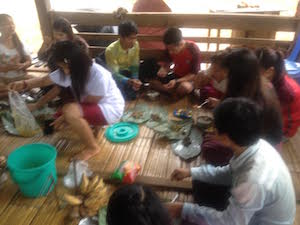
“A young community worker from Lashio, a town in Eastern Myanmar, tells me about her sister who will be going to the US soon to study a Master in Education Management. Four times before she applied for a scholarship, and finally the fifth time paid off. It are only those from Yangon and Mandalay - Myanmar’s main cities - who get scholarships complains the second. I am sitting in the office of a local CBO for a group interview with community workers. I have heard before during my travels around the country, how people from ethnic areas feel selection committees are largely biased in favour of students from central Myanmar, while they argue, they should get the opportunity to study abroad, because their involvement in their communities means they will be more likely to come back to Myanmar and serve their community. A few days later I sit in an interview with a lady who turns out to be the sister that finally got a scholarship to study in the US. She tells me how although she was not the only ethnic woman to get a scholarship from the American Embassy, she was the only person who had currently been living and working in an ethnic area. I learn how years of following different courses aimed at learning academic- and English skills, working for projects, joining clubs and networks mostly in Yangon finally got her to where she is now.”
These focus groups were part of a research that aimed to find out what barriers women from ethnic areas face to be able to access higher education abroad. With the help of Marjan Rens Stichting I conducted fieldwork for We women foundation. We women helps prepare aspiring women leaders from ethnic areas in Myanmar to study abroad. The outcomes of this study will help We women redesign their university preparation program in Myanmar after they moved from assisting women migrants from Myanmar to assisting women in Myanmar.
For people in Myanmar going abroad to study is not just about gaining international experience. It is essential for those who want to enjoy quality education. Myanmar’s higher education system has suffered decades of disinvestment, and the governments strategy to prevent its citizens from becoming critical citizens has led to an education system that is centered around memorizing facts in order to pass exams, instead of a teaching-style that encourages students to apply, analyze and think about what they have learned. This is especially the case for women who aspire to become leaders. In a country were women are largely held back by traditional gender prescribed roles, and women have little voice in decisions-making process, women need a foreign degree not just to gain meaningful skills and knowledge, but also to be taken seriously. In addition women from ethnic areas face double challenges because of the marginalized position people from ethnic areas hold in Myanmar society.
I travelled across the country as part of a 2,5 months fieldwork period, and spoke to a wide range of actors in Yangon and in Myanmar’s major ethnic area cities. I spoke to many women ranging from young university students whose dream of once being able to study abroad seemed no more than a dream, to women who were preparing for their IELTS or TOEFL exam or those busy applying for scholarships and whose dream to study abroad seemed somewhat more reachable, to those who had already studied abroad.
The second group of interviewees were organizations who offer university preparation training, or general training that teaches students skills they would need if they would apply for a foreign university. I was also able to speak to a number of women’s organization who could shed light on the situation of women from Myanmar’s ethnic areas.
As I found out very soon doing practice based research is not just about speaking to people and organizations to obtain data for this project. It was also about the chance to increase We women’s network. As such I also found myself giving presentations to English language students about We women’s activities and giving them tips on how to apply for scholarships. I was also able to establish many meaningful contacts with organization and individuals who could possibly partner with We women in the future.

